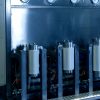The transition from laboratory tests to industrial-scale processes is always very complex, since, by developing the individual production phases, obstacles can arise due to both the sizing and the transformation process itself. In fact, with the increase in size, production waste, residual material or even preferential paths for the supercritical solvent (CO2) may increase, even critically.
In this phase of development in which extraction or other industrial processes such as fractionation or micronization of extracts are planned, the operating parameters are optimized and the yield of the process is maximized. This first step, fundamental in any research aimed at industrialization, must already be carried out on a semi-industrial scale in order not to run into those classic problems of small-scale research, such as simplified separation of extracts from small dimensions, or the extraction of compounds difficult to define in quantities , when they are too small.
The next step allows us to quadruple the volume of the implant extractor, therefore going from 5l to 20l. This transition to industrial dimensions allows us to highlight further problems that could arise in a scale-up. Our commitment is therefore aimed at carrying out experimental studies that guarantee the customer an easy industrial scale-up.


